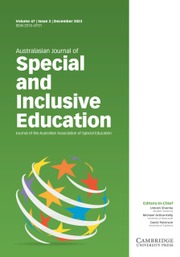No CrossRef data available.
Article contents
Tic of the Iceberg: Strategies to Support Students With Tourette Syndrome in Higher Education
Published online by Cambridge University Press: 15 February 2021
Abstract
Tourette syndrome (TS) is a challenging and poorly understood condition that can have a considerable negative effect on an individual’s ability to learn, despite there being little to no impact on their intelligence. In this paper, we detail the experiences of 2 higher education staff who supported a student with severe TS to undertake studies in a university bridging program. We make suggestions and recommendations for teachers who have students with TS. Over the course of 5 semesters, the teaching team researched TS in order to understand what the student was facing and adjusted their teaching strategies and the learning environment to overcome the complications that the condition presented. The design of the learning environment and the embedded accessible pedagogy that we found helpful are framed and discussed using the 3 primary principles of universal design for learning: engagement, representation, and action and expression. The authors utilise the minimal model of Rolfe, Freshwater, and Jasper (2001) to reflect upon and share their practice.
Keywords
- Type
- Special Education Perspectives
- Information
- Australasian Journal of Special and Inclusive Education , Volume 45 , Issue 1 , July 2021 , pp. 96 - 104
- Copyright
- © The Author(s), 2021. Published by Cambridge University Press
Footnotes
This manuscript was accepted under the Editorship of David Paterson.


